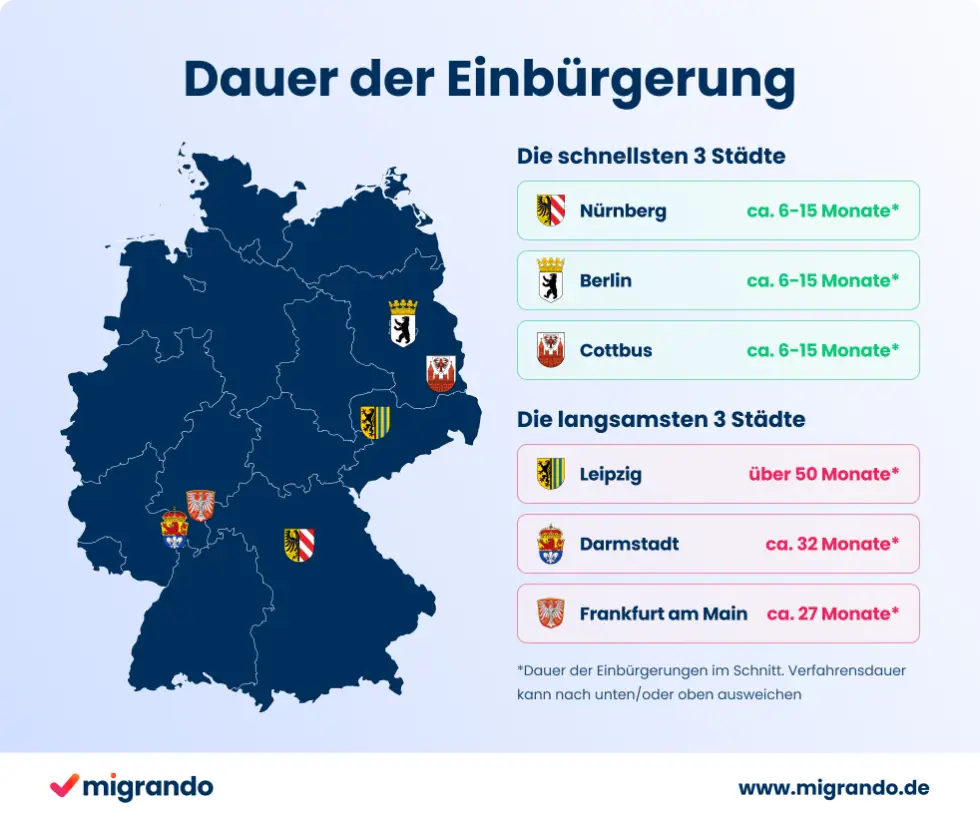What does it mean to have German citizenship?
German citizenship gives you extensive rights - but also specific obligations. As a German citizen, you can take part in political elections, rely on consular protection worldwide and much more. At the same time, you undertake to be loyal to the state and to comply with the law.
Rights as a German citizen
With German citizenship, you enjoy comprehensive political and social rights. These rights enable you to participate fully in social life and ensure you receive international support from the German authorities.
- Right to vote and stand for election at federal, state and municipal level
- Freedom of movement within the EU
- Entitlement to a German passport
- Access to public offices (e.g. career as a civil servant)
- Consular protection abroad
- Right to enter and stay in Germany without restriction
Duties as a German citizen
With German citizenship, you assume responsibility for the community. This means that you should also actively participate in the democratic constitutional state and promote respectful coexistence.
- Compliance with German laws and constitutional principles
- Compulsory schooling for children
- Tax liability in Germany
- Participation in official proceedings (e.g. duty to provide information)
German citizenship therefore not only brings you new opportunities, but is also a sign that you are a permanent part of this society.
How can you obtain German citizenship?
As a rule, German citizenship can be acquired in two ways: by birth or by Naturalization. German citizenship for foreigners is acquired through Naturalization . Since June 2024, new regulations have been in place to make the process simpler and more transparent.
Immigrants can generally be naturalized after five years of legal residence. Requirements include:
- a secure livelihood,
- German language skills at B1 level,
- a passed naturalization test and
- the commitment to the free democratic basic order(declaration of loyalty).
Common challenges in the naturalization process - and how to solve them
Although the conditions for Naturalization in Germany were eased in 2024, the procedure remains complex due to the many points that need to be fulfilled. A lack of information or long waiting times often lead to frustration. In addition, the various authorities sometimes communicate different requirements, although the procedure itself is regulated uniformly.
In the following sections, we will show you the typical hurdles that can arise during Naturalization - and how you can overcome them efficiently and with legal certainty.
Unclear requirements of the authorities: Which documents really count
Incomplete or incorrectly formatted documents are among the most common reasons for delays or rejections. But what exactly "complete" means is often not clearly communicated - because many authorities work with internal checklists that are not publicly accessible.
It is therefore important that you prepare your documents as completely as possible. Make sure that all documents are up-to-date, originals or certified copies and correctly translated if they are not in German. Even small gaps or formal errors in your documents can lead to delays.
List all documents in the order in which they are required in the official information sheet. This speeds up the check and significantly reduces the number of queries. If you are unsure, you can also have your documents checked in advance, e.g. by Migrando.
Our experts know the requirements in your region inside out. This will help you avoid typical mistakes such as missing certified translations, invalid proof of language level or unclear identity details.
Our comprehensive checklist will help you avoid typical omissions and give you a clear overview of which documents are still missing.
Long waiting times: What you can do if nothing happens
If your Naturalization remains unprocessed for months, you do not have to simply accept this. In many cases, it helps to make regular and targeted enquiries to the authorities. If this remains unsuccessful, you can take legal action if necessary.
The processing time for naturalizations is often very long for various reasons and varies from city to city. The most common reason for the long processing times is an insufficient number of employees at the authority, who have to process a large number of naturalization applications.
If you are also waiting for a response from the authority, you should first ask regularly and politely how far your application has progressed.
If this is also unsuccessful, you should file a Lawsuit for failure of act should be considered. This can be lodged with the administrative court as soon as you have been waiting more than 3 months for your naturalization decision. If you want to take this step, Migrando 's legal experts can assist you every step of the way.
We check for you whether such a complaint makes sense and, if you wish, we can take over communication with the authorities. In many cases, professional intervention alone will result in your application being processed again - without any court proceedings.
Lack of information and advice
Many applicants are faced with unanswered questions when it comes to Naturalization - and feel left alone. There is often a lack of individual contacts, clear statements or concrete help from the authorities.
This is exactly where Migrando comes in: Our specialized teams accompany you personally through the entire process. We check your documents, identify potential for optimization and prepare your file so that it meets the requirements of the relevant authority - regardless of whether you live in Berlin, Munich or a rural community.
We also support you in making appointments, completing complex forms and communicating with authorities in a legally compliant manner. In the event of problems or delays, we intervene at an early stage and show you all your legal options - up to and including a Lawsuit for failure of act.
Authorities relating to German citizenship
If you want German citizenship, you will have to deal with several different authorities. While the Federal Ministry of the Interior and Home Affairs (BMI) is responsible for legislation, the Federal Office for Migration and Refugees (BAMF) and the immigration authorities will check your requirements for Naturalization. Here you can find out who you should contact in which situation.
Federal Ministry of the Interior and for Home Affairs (BMI)
The BMI is the central ministry for issues relating to German citizenship. It drafts laws, implements reforms and publishes so-called application notes on the Citizenship Act (StAG). These are intended to ensure a uniform interpretation of the law by the naturalization authorities.
This information is particularly helpful for individual case decisions - for example, in the case of unclear identities or the various valid language certificates. They also provide information on how deadlines are to be interpreted or what is meant by a secure livelihood.
Federal Office for Migration and Refugees (BAMF)
The BAMF plays a central role when it comes to the protection status of people applying for German citizenship. For recognized refugees in particular, the Federal Office checks whether the protection status still exists or needs to be revoked - for example in the event of travel to the country of origin or new findings regarding identity.
Local naturalization authorities and registry offices
The municipal immigration and naturalization authorities are your first point of contact in the naturalization process. They accept applications, check documents and are responsible for communicating with other authorities. Procedures, deadlines and responsibilities may vary depending on the federal state.
- In Berlin, for example, there are detailed procedural instructions that are publicly accessible and provide guidance for applicants.
- In Hesse, two administrative levels - the local authority and the regional council - are sometimes involved, which makes the process more complex.
You can find an overview of the responsible authorities including addresses and opening hours in our document for download.

Nationality: German become with Migrando
The reform of the Citizenship Act in 2024 has simplified many things - nevertheless, Naturalization remains a complex issue with many things to consider. Migrando accompanies you every step of the way: from checking your chances to preparing your application and communicating with the authorities. This will help you obtain German citizenship quickly and safely.
FAQ - Frequently asked questions about German citizenship
Can I keep my German citizenship if I live abroad for a longer period of time?
Yes, in principle you retain your German citizenship even if you live abroad permanently. However, there are rare exceptions: In the case of longer stays outside the EU, it can be lost under certain circumstances, for example if you are voluntarily working for a foreign state (e.g. joining a foreign military service without authorization). If in doubt, seek legal advice.
How does Naturalization affect my family members?
The Naturalization of a person has no automatic influence on the residence status or nationality of spouses or children; however, they can then more easily obtain a permanent Residence permit . There are special regulations, e.g. for underage children who can be naturalized together with a parent (§ 10 StAG). Seek individual advice on this.
Why do I have to keep sending documents to the authorities during my application?
Authorities are obliged to check all information carefully. In the event of incomplete or outdated documents, changes in your living situation or longer processing times, the authority may request new evidence. Therefore, always keep your documents up to date - this will speed up processing considerably.
What are the costs for Naturalization?
The standard fee for Naturalization is € 255. For underage children who are naturalized together with a parent, the fee is €51. Additional costs for Naturalization may be incurred for certifications, translations or passport documents. The scale of fees is regulated nationwide(§ 38 StAG).









